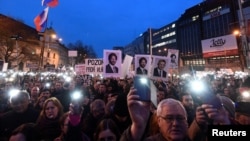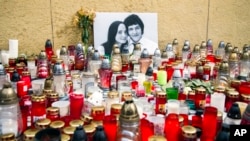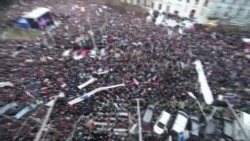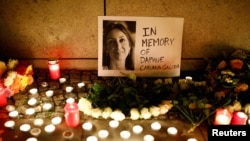Tens of thousands of protesters have once again taken to the streets of cities in Slovakia, following the murder of a journalist and his fiancée two weeks ago. Many demonstrators are calling for fresh elections and directing their anger toward the government.
“The government should step down. It is obvious they all just stick together, they all just want to keep their positions in power,” protester Miroslav Sputsova told the crowd Friday evening in Bratislava.
The Feb. 25 killing of Jan Kuciak and his fiancée, Martina Kusnirova, has shaken Slovakia and Europe, where there is growing concern over press freedom and safety following a number of attacks in recent months.
Kuciak had reported on fraud among Slovak businesses and politicians, including people connected to the Slovak governing party “Smer.” He linked the corruption to the Italian mafia group ‘Ndrangheta.
The bodies of Kuciak and Kusnirova were found in their apartment in a village outside the capital. Both had been shot to death.
Protesters seek turning point
The protesters say the murders should be a turning point in Slovakia’s politics. President Andrej Kiska has called for fresh elections or a government reshuffle, but Prime Minister Robert Fico has refused to budge.
“What happened after the murder of the journalist and his girlfriend suggests that there is an attempt to totally destabilize this state,” Fico said in a televised statement Friday.
Earlier in the week, he offered a reward of $1 million euros to anyone who helps find the killers, appearing in front of the cameras next to the pile of cash.
He later suggested the anti-government protests are being organized overseas, and even pointing the finger at billionaire U.S. investor George Soros. His accusations echo fellow populist leaders in Poland and Hungary. Soros denies the accusations.
WATCH: EU Fears Press Freedom Under Threat, as Protesters Return to Streets of Slovakia
EU delegation
This week a delegation of European Union lawmakers visited Slovakia on a fact-finding mission. The EU has voiced growing concern over the state of press freedom. Campaigners say the restrictions and the dangers are growing.
“Authoritarian governments creeping in from Turkey and Russia, now in towards Slovakia, the Czech Republic where now also the president has in public brandished a fake Kalashnikov saying ‘this is for journalists,’ Bulgaria and that part of the world as well, and of course the former Yugoslavia,” said William Horsley, vice-president of the Association of European Journalists.
“In all those countries, violence, lack of protection, and hostility of the state authorities are a daily thing,” Horsley, told VOA.
In October, Maltese journalist Daphne Caruana Galizia was killed by a car bomb. She was also investigating corruption and had faced repeated libel lawsuits, including one brought by Prime Minister Joseph Muscat. Three suspects have been charged with Galizia’s murder. All too often, justice is elusive, Horsley said.
Journalists, democracy in danger
“The law has become hostile, the political climate now with the takeover of oligarch groups controlling the media, controlling the message and enforcing it. And above all I think the undermining of the idea of protection in the law and the independence of the judiciary. So, when journalists are attacked or even killed, there is virtual impunity,” he added.
The group “Reporters without Borders” has warned that in some parts of Europe, the free media — and therefore democracy itself — is in danger.









